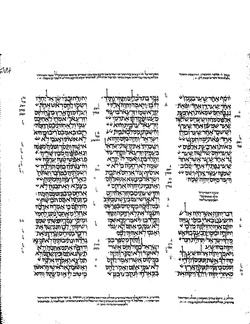
Back Sefanja Afrikaans سفر صفنيا Arabic ܣܦܪܐ ܕܨܦܢܝܐ ARC سفر صفنيا ARZ Zefanja (Buach) BAR Buku Sepania BBC Кніга прарока Сафонія Byelorussian Книга на пророк Софония Bulgarian Levr Sefania Breton Llibre de Sofonies Catalan
 | |||||
| Tanakh (Judaism) | |||||
|---|---|---|---|---|---|
|
|
|||||
| Old Testament (Christianity) | |||||
|
|
|||||
| Bible portal | |||||

The Book of Zephaniah /ˌzɛfəˈnaɪ.ə/ (Hebrew: צְפַנְיָה, Ṣəfanyā; sometimes Latinized as Sophonias) is the ninth of the Twelve Minor Prophets of the Old Testament and Tanakh, preceded in all traditions by the Book of Habakkuk and followed by the Book of Haggai. The book has three chapters.[1] Zephaniah is a male given name which is usually interpreted to mean "Yahweh has hidden/protected",[2] or "Yahweh hides".[3] The church father Jerome of Stridon interpreted Zephaniah's name to mean "the watchman of the Lord".[4] The original text of the prophecy was written in Biblical Hebrew.
Scholars propose various dates of composition; some scholars argue that the book was probably composed during the reign of Josiah (late-seventh century BCE),[5][6] while others hold that an original core of oracles was expanded and edited in exilic or later times.[7][8]
- ^ "The Bible (online)".
- ^ Grudem et al. 2008, p. 1729.
- ^ Carson et al. 2015, p. 1839.
- ^ "The Prophecy of Sophonias | EWTN". EWTN Global Catholic Television Network.
- ^ Renz, Thomas (2021). The Books of Nahum, Habakkuk, and Zephaniah. Wm. B. Eerdmans Publishing. p. 71. ISBN 978-1-4674-6184-9.
- ^ Timmer, Daniel C. (2024). The Theology of the Books of Nahum, Habbakuk, and Zephaniah. Cambridge University Press. pp. 181–183. ISBN 978-1-108-47559-4.
- ^ Quine, Cat (2021). The Oxford Handbook of the Minor Prophets. Oxford University Press. pp. 499–510. doi:10.1093/oxfordhb/9780190673208.013.8.
- ^ Hagedorn, Anselm C. 2011. “When Did Zephaniah Become a Supporter of Josiah’s Reform?” JTS 62:465-469.
© MMXXIII Rich X Search. We shall prevail. All rights reserved. Rich X Search